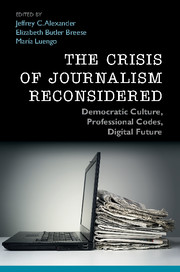Book contents
- Frontmatter
- Dedication
- Contents
- About the Contributors
- Preface
- Acknowledgments
- Introduction: Journalism, democratic culture, and creative reconstruction
- PART I THE CRISIS NARRATIVE
- PART II FEARS OF DIGITAL NEWS MEDIA: THE SYMBOLIC STRUGGLE
- PART III PROFESSIONAL JOURNALISM, CIVIL CODES, AND DIGITAL CULTURE
- Conclusion: News innovations and enduring commitments
- Index
- References
Introduction: Journalism, democratic culture, and creative reconstruction
Published online by Cambridge University Press: 05 June 2016
- Frontmatter
- Dedication
- Contents
- About the Contributors
- Preface
- Acknowledgments
- Introduction: Journalism, democratic culture, and creative reconstruction
- PART I THE CRISIS NARRATIVE
- PART II FEARS OF DIGITAL NEWS MEDIA: THE SYMBOLIC STRUGGLE
- PART III PROFESSIONAL JOURNALISM, CIVIL CODES, AND DIGITAL CULTURE
- Conclusion: News innovations and enduring commitments
- Index
- References
Summary
For most members of the civil sphere, and even for members of its institutional elites, the news is the only source of firsthand experience they will ever have about the vast majority of their follow citizens, about their motives for acting the way they do, the kinds of relationships they form, and the nature of the institutions they create. Journalistic judgments thus possess an outsized power to affect the shape-shifting currents of contemporary social life, from people's movements to legal investigations, foreign policy, public opinion, and affairs of state. The reputation of news media – their ability to represent the public to itself – depends on the belief by their audiences that they are truly reporting on the social world, not making stuff up, that they are describing news factually rather than representing it aesthetically or morally.
Conceptualizing news media in this manner provides a dramatically different perspective on the contemporary “crisis in journalism.” Most social commentators, and journalists themselves, understand this crisis in economic and technological terms – as the challenge to the economic viability of newspapers triggered by the digital revolution in publishing and news distribution. Many leading journalistic institutions in the West have experienced great economic upheaval, cutting staff and undergoing deep, often radical, reorganization – in efforts to meet the digital challenge. Rather than seeing technological and economic changes as the primary causes of current anxieties, however, I wish to draw attention to the role played by the cultural commitments of journalism itself. Linking these professional ethics to the democratic aspirations of the broader societies in which journalists ply their craft, I will suggest that the new technologies can be, and are being, shaped to sustain value commitments, not only undermine them.
Recent technological change and the economic upheaval it has produced are coded by social meanings. It is this cultural framework that has transformed material innovation into social crisis – for the profession, the market, and for society at large. But cultural codes not only trigger sharp anxiety about technological and economic changes; they also provide pathways to control them, so that the democratic practices of independent journalism, rather than being destroyed, can be sustained in new forms.
- Type
- Chapter
- Information
- The Crisis of Journalism ReconsideredDemocratic Culture, Professional Codes, Digital Future, pp. 1 - 28Publisher: Cambridge University PressPrint publication year: 2016
References
- 16
- Cited by

